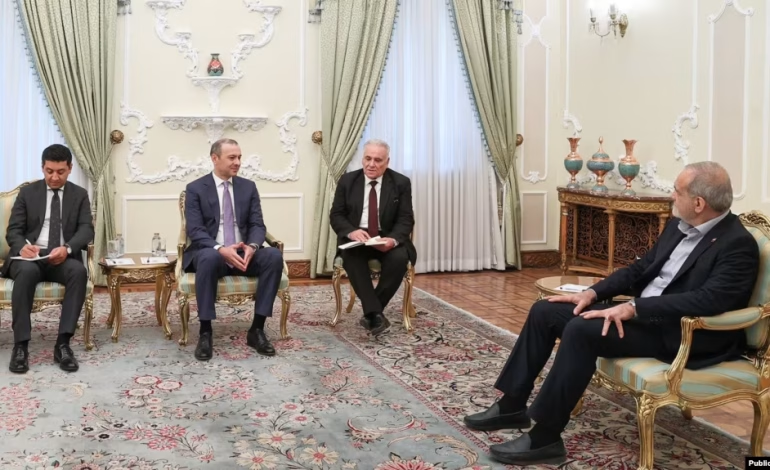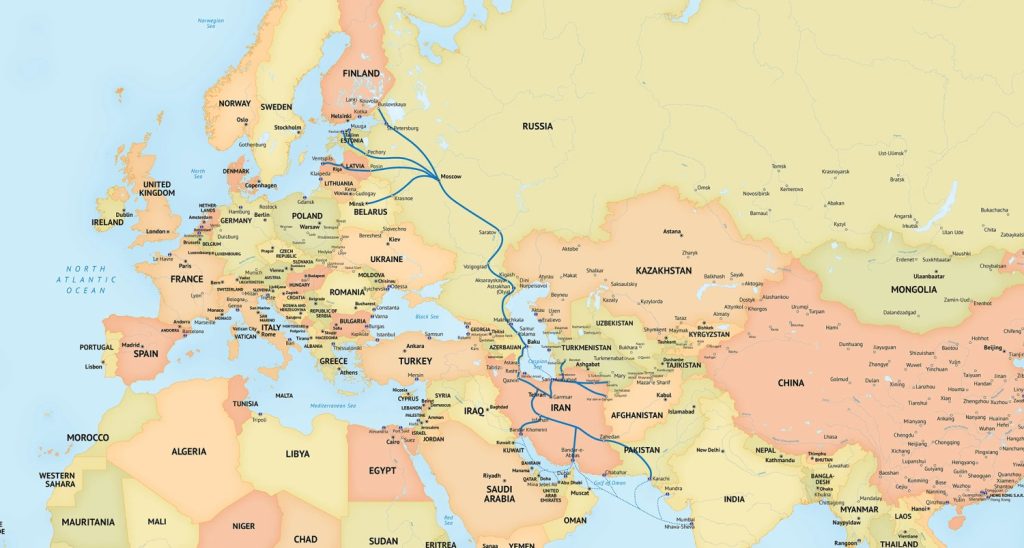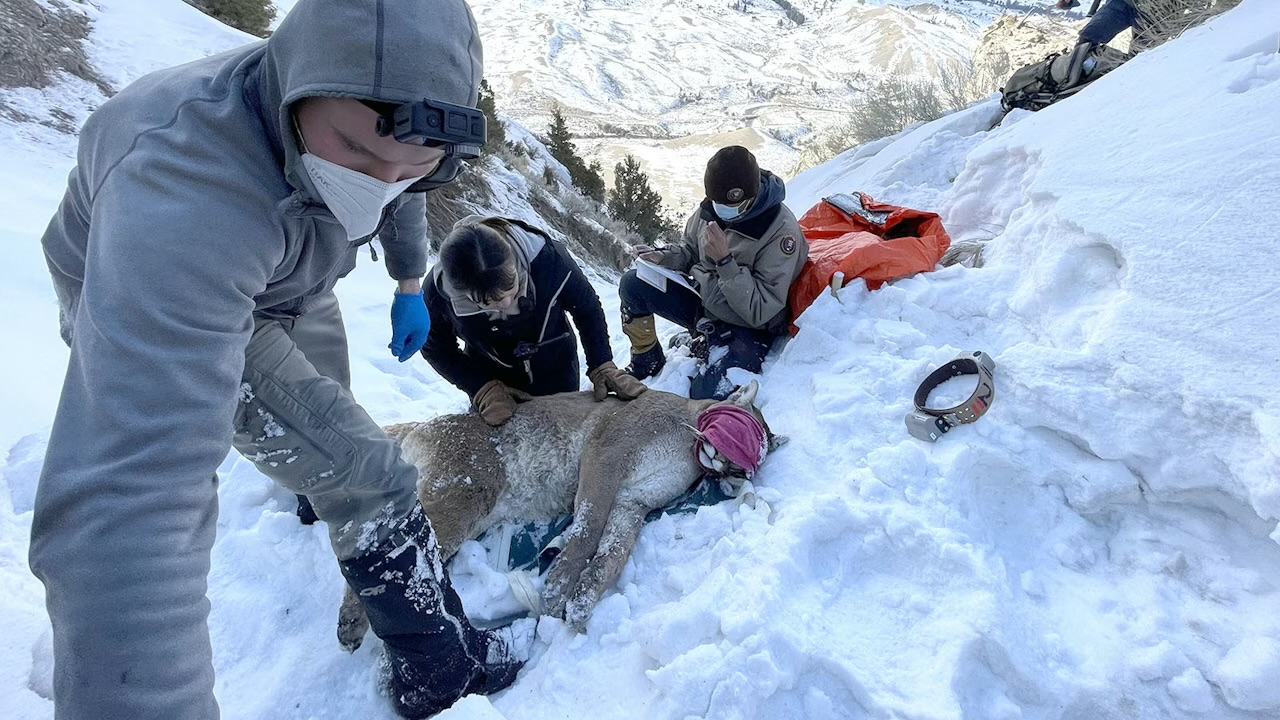ANALYSIS: Yerevan Calms Tehran—For Now

Armenia says it can open a land bridge for Azerbaijan without inviting a US security footprint to its southern border. Over the weekend, Iran’s new president Masoud Pezeshkian signaled he’s (mostly) convinced—saying assurances from Armenian leaders have “largely alleviated” Tehran’s fears about foreign forces near the Syunik frontier. That’s a notable shift after weeks of alarm inside Iran over a deal that would give Washington exclusive rights to a transit link connecting Azerbaijan to its Nakhichevan exclave through Armenian territory.
This corridor—rebranded in Washington as the Trump Route for International Peace and Prosperity (TRIPP)—was pledged by Prime Minister Nikol Pashinian during an August 8 White House sit-down with Ilham Aliyev hosted by President Donald Trump. Trump even floated a lease “up to 99 years.” Pashinian, for his part, says no fixed agreements exist yet and that the nuts-and-bolts—security, customs, duration—will be hammered out in September talks.
Tehran’s initial reaction was icy. Iran treats the uninterrupted Armenia–Iran border as a strategic red line and bristled at any hint of an American security presence in Syunik. Even after Pezeshkian’s August 19 meeting with Pashinian in Yerevan, he warned against “outsourcing regional issues.”
The needle moved during a follow-up session with Armen Grigorian, Armenia’s Security Council chief. Pezeshkian now says Armenian guarantees eased worries about “foreign forces in this sensitive area” and praised new Iran–Armenia agreements struck during his trip. The message:
“No foreign power should disrupt our strategic ties.”
Still, Iran’s more conservative power centers are not sold. The army’s chief of staff, Gen. Abdolrahim Mousavi, told Grigorian he opposes the “presence of extra-regional powers, including the United States.” Yerevan’s counter-message: Armenia retains full control over the corridor and will protect relations with Tehran.
At home, Pashinian faces critics who say he’s conceding an extraterritorial link long demanded by Baku. Azerbaijani officials have publicly claimed Yerevan accepted a land corridor; Turkish leaders have started referring to the route by Baku’s preferred branding, the “Zangezur corridor,” even while Washington pushes the TRIPP label.
The choreography continues. On September 1, Pashinian met Aliyev and Recep Tayyip Erdogan on the sidelines of the SCO summit in China—no big disclosures, but a reminder that the file is moving on multiple tracks at once.

While the political framing grabs headlines, Iran and Armenia are busy turning spanners. Iran’s rail chief met Armenian Railways in St. Petersburg to revive west-route traffic on the International North–South Transport Corridor (INSTC) via Nakhchivan, restoring long-dormant Iran–Armenia–Russia rail links—if Baku–Yerevan politics permit.
The two countries launched a joint chamber committee to unblock certificate-of-origin snarls, push “green corridor” lanes for perishables, and digitize border paperwork. Tehran says tariffs on 87% of goods in Iran–Armenia trade have been zeroed, leveraging Iran’s EAEU observer status and Yerevan’s access to both the EAEU (184M consumers) and the EU via trade arrangements.
Work continues on a second Aras River bridge and a third power-exchange line, plus tenders on Armenia’s north–south route—some awarded to Iranian contractors. Fuel supply to Armenian airlines and electricity/LPG swaps are on the table.
Bilateral commerce is nearing $1 billion and aiming at $3 billion, with investment pitches spanning mining, agri-food, pharma, renewables, IT/R&D, and logistics tied to the INSTC.
Bottom line: even as the corridor debate simmers, economic interlock between Iran and Armenia is accelerating.
Right now, it’s a framework with major blanks: Armenia insists on full sovereignty—no extraterritorial handover. Tehran wants zero US security presence; Yerevan says the corridor won’t threaten the Iran border. Trump floated up to 99 years; Pashinian says no fixed term is agreed. Washington calls it TRIPP; Baku and Ankara keep saying “Zangezur.” That semantic split signals real disagreements about control and access.
What to watch next?
- September technical talks: Do the parties codify Armenian jurisdiction, border guarantees to Iran, and rules for customs, policing, and emergencies along the route?
- Iran’s security red lines: Does Pezeshkian’s reassurance hold against pushback from IRGC-aligned voices and the military?
- INSTC west-route reboot: If the corridor deal stabilizes, does Nakhchivan–Yerevan rail actually reopen—and with it a quicker Iran–Russia freight path?
- Trade runway: Are tariff cuts, the power line, and border upgrades enough to push trade toward the $3 billion goal?
- Domestic politics in Armenia: Can Pashinian sell a sovereignty-first corridor at home while Baku and Ankara trumpet Zangezur abroad?
Armenia has lowered the temperature with Iran by promising a corridor it controls—not an extraterritorial carve-out. But semantics mask hard choices. If TRIPP becomes a real artery, it could re-draw the Caucasus logistics map and plug Armenia deeper into Iran–EAEU–EU trade networks. If it stumbles, expect a return to zero-sum brinkmanship—because in this neighborhood, corridors are never just roads.









The latest news in your social feeds
Subscribe to our social media platforms to stay tuned